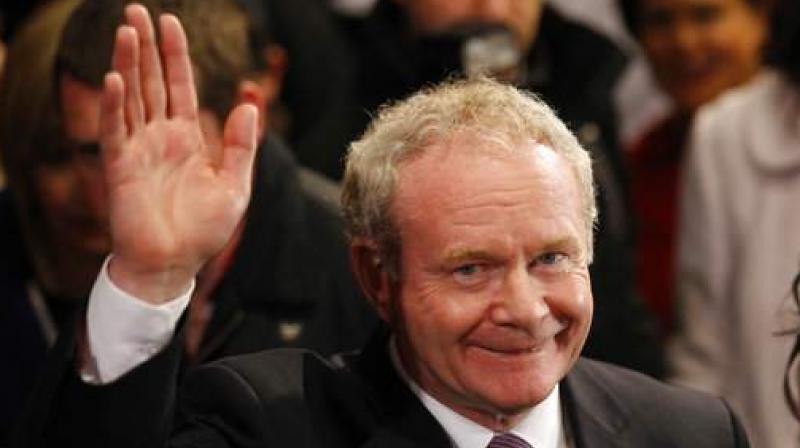Ireland's rebel-turned-politician Martin McGuinness dies at 66
His Sinn Fein party announced the death in a statement on Tuesday, expressing \"deep regret\".

London: Martin McGuinness, a one-time Irish Republican Army commander who later helped negotiate an end to the conflict in Northern Ireland, has died aged 66.
His Sinn Fein party, which opposes British rule in Northern Ireland and was long considered the political arm of the IRA, announced the death in a statement on Tuesday, expressing "deep regret".
The BBC said McGuinness, who trained to be a butcher in his native Derry and went on to play a central behind-the-scenes role in an historic 1998 peace deal, had died of a rare heart condition.
"While I can never condone the path he took in the earlier part of his life, Martin McGuinness ultimately played a defining role in leading the Republican movement away from violence," Prime Minister Theresa May said in a statement.
"In doing so, he made an essential contribution to the extraordinary journey of Northern Ireland from conflict to peace," she said.
The violence in Northern Ireland killed around 3,500 people. Colin Parry, whose 12-year-old son Tim died in an IRA bomb in the English town of Warrington in 1993, told BBC radio that he could not forgive McGuinness but paid tribute to his "desire for peace".
McGuinness was "a brave man, who put himself at some risk" from more hardline republicans, Parry said.
But British lawmaker Norman Tebbit, whose wife Margaret was paralysed in the IRA's 1984 Brighton Hotel bombing, said the world was "a sweeter and cleaner place now" without McGuinness.
"He was not only a multi-murderer, he was a coward," he said, adding that McGuinness only became a peacemaker to "save his own skin".
Julie Hambleton, the sister of one of the 21 victims of two IRA bombs in pubs in Birmingham in central England in 1974, said McGuinness had been "selective with the truth" about his time in the IRA.
"With him the truth has died," said Hambleton, who is still campaigning for the perpetrators of the pub bombings to be brought to justice.
McGuinness had resigned from politics in January, citing a serious illness and a breakdown in relations with the rival Democratic Unionist Party.
Sinn Fein refused to appoint a replacement due to the row with the pro-British DUP, triggering local elections this month in which it made major gains.
The two parties are currently deadlocked, meaning that the British government could impose direct rule of Northern Ireland from London within weeks.
Ten years ago in May McGuinness had made history by entering government with his once bitter foe, Ian Paisley of the DUP.
The decision to share power was a key part of the peace process in Northern Ireland. Former Prime Minister Tony Blair, one of the architects of the 1998 peace deal, said he would not have been able to do it without McGuinness.
"For those of us able finally to bring about the Northern Ireland peace agreement, we know we could never have done it without Martin's leadership, courage and quiet insistence that the past should not define the future," Blair said in a statement.
McGuinness was a commander in the IRA paramilitary group that fought for the province to leave Britain and join the Republic of Ireland to the south.
In a memorable gesture that would once have been unimaginable, he shook hands with Queen Elizabeth II during her visit to Belfast in 2012. McGuinness was born in 1950 in Derry, on the province's northern coast, and grew up in the city when it was riven by sectarian bloodshed.
He became involved in the civil rights movement as a teenager and rapidly rose through the ranks of the IRA. He was second in command at the time of Bloody Sunday in 1972, when British soldiers shot 26 unarmed republican protesters in Derry, killing 13 of them.
He served prison time for IRA-related activities. McGuinness later became Northern Ireland's deputy first minister in 2007 working alongside Paisley.
Sinn Fein leader Gerry Adams called his former colleague a "passionate republican who worked tirelessly for peace and reconciliation and for the re-unification of his country".
He ended his statement with an Irish quote which translates as: "A faithful soul among the heroes of Ireland".

